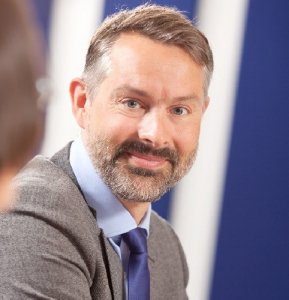Supporting cancer research with IP rights

Why are legal services an important part of Oslo Cancer Cluster? We asked Andrew Wright from Potter Clarkson to explain why they became a member.
Oslo Cancer Cluster helps to connect start ups and entrepreneurs in the cancer field to the legal service providers they need. There are many reasons why a law firm specialising in intellectual property (IP) rights is an important part of a cancer cluster. IP rights play an essential role in securing protection, and developing the value, in an idea or invention.

Andrew Wright, a partner in the law firm Potter Clarkson, member of Oslo Cancer Cluster.
Andrew Wright, a partner in Potter Clarkson, explained why they became a member of Oslo Cancer Cluster:
“We have, for a long time, recognised the important developments in the field of oncology being pursued by members of the Oslo Cancer Cluster.
“This is an exciting time to be involved with Oslo Cancer Cluster, and Potter Clarkson thrives on opportunities to interact, and collaborate, with scientists and innovative companies that have ground-breaking ideas and an enterprising outlook.”
– To build value to attract investors and support ongoing development;
– To realise value in an invention by out-licencing to a commercial partner, in order to generate a funding stream; and/or
– To create exclusivity for the next stage of your commercial plans.
Source: Potter Clarkson
Supporting growth
A law firm with experts in IP rights can support innovators and entrepreneurs. They can provide guidance and assistance when seeking to obtain protection for new ideas, developments and inventions.
“Strong protection through relevant IP rights can be critical to the success of any start up or developing business. We believe that there is the potential for outstanding synergy between the needs of the members of Oslo Cancer Cluster and the support that Potter Clarkson offers.” Andrew Wright, Potter Clarkson
Building value
Early-stage companies in the cancer field often face great challenges when commercialising their products. Their ideas may only exist on a conceptual level or their products may be at a pre-clinical stage. It can take a company many years to bring a product to market, after developing their technologies and seeking the necessary approvals. It is critical that these companies can fund the ongoing development during this period.
“The decision of whether or not to invest, and the scale of any investment, will typically be based on how well the technologies that form the core of a company have been protected by suitable IP rights.” Andrew Wright, Potter Clarkson
Patent protected
Patents are often the main form of IP right. The objective of a patent application is typically to obtain protection for the general concept that underlies an invention, to provide a legally-enforceable right that can prevent competitors either from copying the invention itself, or from launching a closely-related equivalent based on the same concept.
Strong patent rights can provide companies with the ability to control the future commercialisation of their inventions. An owner of patent rights can also negotiate with other companies for licensed access to their invention, whether they want to commercialise it directly or develop it towards a collaborative product.
Entrepreneurs or start ups can apply for patents themselves through the European Patent Office, but it is often a complicated process. Therefore, it may be a good idea to get some advice from a patent professional.
“Having patent protection, or the opportunity to obtain patent protection, provides strong and commercially-relevant coverage for the core technology of the company and being able to present a plan for generating and supporting future IP, can be key to the success of a Lifescience start up.” Andrew Wright, Potter Clarkson
Biotech meets law
All the patent professionals at Potter Clarkson hold degrees in scientific subjects, for example in biotechnology or pharmaceuticals. Their professionals often work across disciplines, which is good as Iinovations do not always fit ‘neatly’ into only a single field of technology. For example, computer-implemented inventions are increasingly used in the field of therapies and diagnostics, and medical devices become ever more important in the delivery of therapies. In this case, the patent professional needs the experience to work across such inter-disciplinary fields.
“We pride ourselves on being technically knowledgeable, on having the ability to quickly immerse ourselves in your specialist area of science, to rapidly understand your invention, and to ask the right questions.” Andrew Wright, Potter Clarkson
For more information about the members of Oslo Cancer Cluster that offer legal services or advice on IP rights, please visit their official websites:







